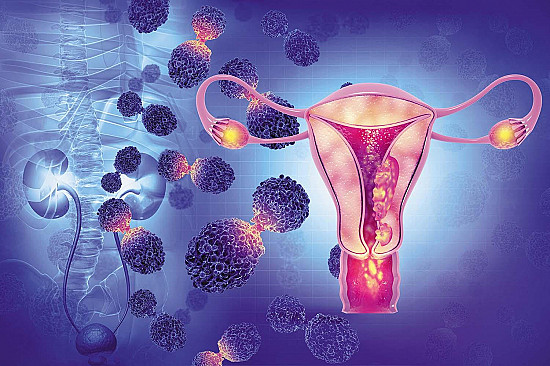
Trying to lose weight? Be careful not to lose muscle

Is your skin problem actually an autoimmune condition?

People with diabetes face higher risk of hearing loss

Antibiotic-free fixes for recurrent UTIs

Musculoskeletal syndrome of menopause: When menopause makes you ache all over

When can older women stop getting mammograms?

To lose weight, especially harmful belly fat, combine diet and exercise

Can men hold off on treating recurring prostate cancer?

The 7 types of rest and why we need them all

What are the early warning signs of cervical cancer?
Kaposi's sarcoma
Kaposi's sarcoma is a type of cancer caused by the human herpes virus 8. It appears as red or purple patches on the skin, mouth, lungs, liver, or digestive system.
Kaposi's sarcoma was a rare and relatively harmless disease until the AIDS epidemic began. An aggressive form of the disease, AIDS-related Kaposi's sarcoma, occurs in people with severely weakened immune systems. It is now the most common type of Kaposi's sarcoma.
There are four main types of Kaposi's sarcoma:
- Classic Kaposi's sarcoma. This rare, slow-growing skin tumor usually affects men of Italian or Eastern European Jewish ancestry.
- African Kaposi's sarcoma. This disease occurs in young men in several African countries. It is usually a slow-growing cancer, but can be aggressive, invading bone and tissue under the skin.
- Immunosuppressive-treatment-related Kaposi's sarcoma. People taking immune-suppressing medication after an organ transplant may develop this form of the disease. It sometimes improves if the immune-suppressing medication is reduced or changed.
- AIDS-related Kaposi's sarcoma. This disease affects people with HIV/AIDS. It usually appears as a rapidly progressing tumor affecting the skin, lymph nodes, digestive tract, lungs, liver, or spleen.
Symptoms
The earliest symptoms of Kaposi's sarcoma are usually red, purple, or brown patches or nodules on the skin. They may look like bruises due to the excessive growth of small blood vessels just below the skin that gives the lesions their purplish hue. In the classic, African, and immunosuppressive forms of the disease, the patches usually grow slowly and develop over years. As the disease gets worse, the legs may swell. In some cases, it will spread to other organs.
In the AIDS-related form, the cancer is much more aggressive, often growing to cover large areas and forming tumor-like masses. These tumors are usually soft and spongy at first, but they become hard and solid over time. The surface of the tumor may develop open ulcers that can become infected.
AIDS-related Kaposi's sarcoma tends to spread beyond the skin. It often affects the mouth, lymph nodes, lungs, liver, spleen, and digestive system. When it spreads to the lungs, it often causes coughing, shortness of breath, and wheezing. Once in the lungs, the disease often quickly gets worse. It can cause respiratory failure, which can be fatal.
When Kaposi's sarcoma gets into the digestive system, it usually doesn't cause any symptoms until it becomes very advanced. People may then develop symptoms of intestinal obstruction (nausea, vomiting, and abdominal pain) or bloody stools. If the lymph nodes become involved, severe swelling can occur, usually in the legs or face.
Diagnosis
If your doctor suspects Kaposi's sarcoma, he or she will ask if you have HIV or another disease that may be suppressing your immune system. If you do not know if you have HIV, but you are at risk for it, your doctor will recommend an HIV test.
Kaposi's sarcoma can be confirmed with a biopsy. In this test, a small piece of tissue is removed and examined under a microscope.
If the biopsy shows Kaposi's sarcoma, your answers to several questions can determine if it has spread:
- Do you have a cough, or are you short of breath? if yes, the cancer could have spread to the lungs.
- Do your legs swell up? If yes, the cancer may have reached lymph nodes.
- Do you experience nausea, vomiting, or abdominal pain, or have blood in your stool? This could mean that the cancer is affecting your gastrointestinal tract.
Treatment
The treatment depends on the type of Kaposi's sarcoma, the size and location of the tumor(s), the extent of the disease, your CD4 count, and your overall health. The goals of treatment are to ease symptoms, shrink the tumor(s), and prevent the disease from getting worse. Treatments include:
- applying medication to lesions on the skin
- surgery to remove tumors
- freezing cancer cells (cryotherapy) to kill them
- using drugs (chemotherapy) to kill cancer cells
- radiation therapy to the cancer cells
- strengthening the body's immune system with biological therapy to better fight the cancer.
In people with AIDS-related Kaposi's sarcoma, treatments for AIDS, such as taking antiretroviral medications, will also fight the cancer.
Disclaimer:
As a service to our readers, Harvard Health Publishing provides access to our library of archived content. Please note the date of last review or update on all articles.
No content on this site, regardless of date, should ever be used as a substitute for direct medical advice from your doctor or other qualified clinician.

Trying to lose weight? Be careful not to lose muscle

Is your skin problem actually an autoimmune condition?

People with diabetes face higher risk of hearing loss

Antibiotic-free fixes for recurrent UTIs

Musculoskeletal syndrome of menopause: When menopause makes you ache all over

When can older women stop getting mammograms?

To lose weight, especially harmful belly fat, combine diet and exercise

Can men hold off on treating recurring prostate cancer?

The 7 types of rest and why we need them all

What are the early warning signs of cervical cancer?
Free Healthbeat Signup
Get the latest in health news delivered to your inbox!
Sign Up




